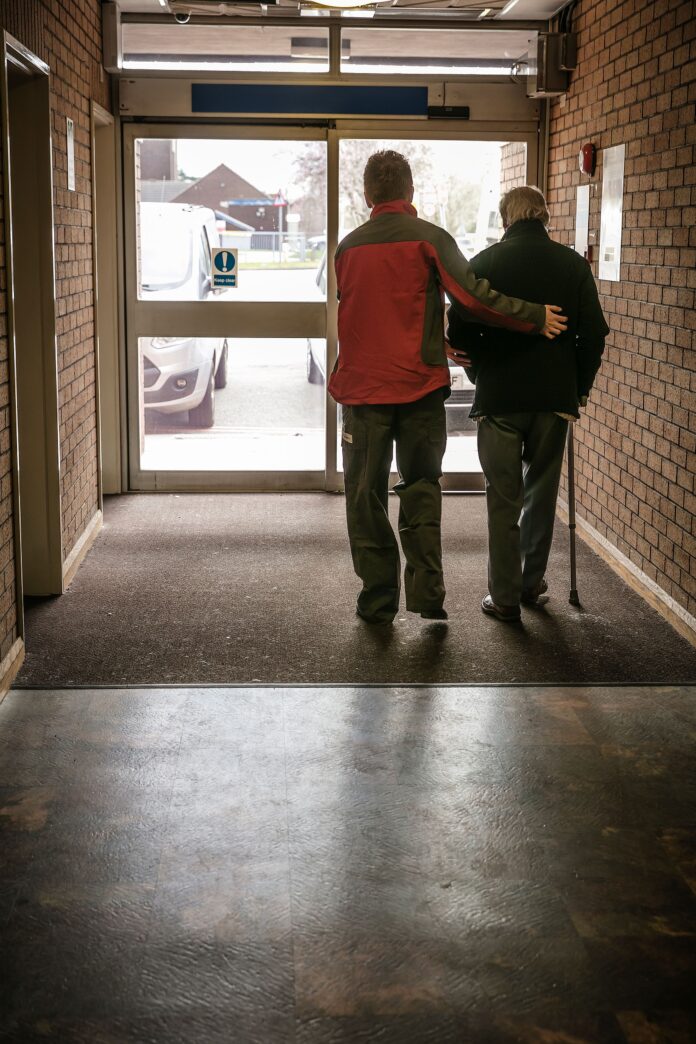A British Red Cross service that has been supporting patients and staff at Welsh Emergency Departments celebrates its fifth anniversary this week.
Red Cross staff and volunteers have helped more than 1.2 million people across Wales since the service first started in December 2018, by providing non-medical assistance and helping to organise transport home for patients.
In addition to supporting with tasks in hospital Emergency Departments, Red Cross staff and volunteers are busy collecting medication and test results for patients, accompanying them to other hospital departments such as X-ray, or sitting with upset or bereaved relatives. They also offer emotional support to patients who are anxious, overwhelmed or alone.
Initially a pilot set up by the Welsh Government and NHS Wales, delivered by British Red Cross staff and volunteers, the service is now commissioned by the individual health boards.
The scheme – which was shortlisted for the NHS Wales Awards and Health Service Journal Partnership Awards, for partnership working with the NHS – currently runs in seven Welsh hospitals: Morriston Hospital in Swansea, Glangwili General Hospital in Carmarthen, The Grange Hospital in Newport, University Hospital Wales in Cardiff, Ysbyty Glan Clwyd in Bodelwyddan, Wrexham Maelor in Wrexham and Ysbyty Gwynedd in Bangor.

Sam Moreton, British Red Cross Team Leader at Ysbyty Glan Clwyd said:
“I’ve been with the Red Cross at Ysbyty Glan Clwyd since the beginning of the service in December 2018 and feel very passionate about it. I’ve seen the service evolve over time. We do what the NHS staff in the Emergency Department need us to do – whether that’s to transport patients home, being there to offer reassurance and emotional support to patients, families and relatives who need that listening ear, PPE restocking, helping at mealtimes or offering teas and coffees.
“We don’t just call it offering teas and coffees; we call it ‘a hug in a mug’.”
Red Cross staff and volunteers provide non-medical support, tailored to individuals and focussed on their practical and emotional needs, to help people leave hospital more quickly and with more confidence so NHS staff can focus on clinical work. Red Cross teams also help by providing transport and resettling people in their homes following a visit to an Emergency Department.
They take people home and spot problems like trip hazards, that could cause another hospital visit. The extra time support workers can spend with people means they can also explore underlying issues, such as whether someone has meaningful connections with other people in their community or require longer-term care at home to live independently. This gives doctors and nurses peace of mind that problems will be picked up, and often helps identify complicated situations where someone’s medical and social needs are entwined, preventing people from going back to hospital unnecessarily.
Sam said: “We also transport patients home. If they’ve been in the Emergency Department for more than a day, we can stop to do some shopping for them. Once they are home, we check things like their heating, if they’ve got food and we get them a cup of tea.
“We check if there is a care package in place, have they got family and friends, neighbours to support them, if they need referring or signposting on to another organisation. For example, on the way home, someone may mention that they have lost their partner and they’re finding it hard. We can help with that and signpost them to bereavement support.
“People may not always ask for help. And that it a big part of our service: to speak to people in a gentle, considerate and compassionate way, and get them the support they need.”
Minister for Health and Social Services, Eluned Morgan said:
“The British Red Cross Wales Emergency Department Well-being and Home Safe Service has gone from strength to strength since its launch back in December 2018, proving to be hugely beneficial to patient and staff well-being, and receiving widespread praise and positive feedback over the last 5 years.
“Not only has the service provided vital emotional and social support for patients during their difficult times, it has also improved transportation links home and helped reduce patients’ length of stay in hospital.
“I welcome the extension of the service at the majority of emergency departments, and the positive impact it will continue to have for all, going forward.
‘The ongoing value of this service is testament to the organisation’s hard-working and caring staff and volunteers, and I thank them for their commitment over the last 5 years.”
Director of the British Red Cross in Wales Kate Griffiths said:
“It is hugely satisfying to see that this service continues after 5 years and is now in hospitals across Wales. Being in hospital can be daunting for some people, and our teams are able to give time to the little things that make a big difference to how patients and visitors feel about their experience in hospital. The British Red Cross has worked in partnership with the NHS in Welsh Emergency Departments ever since the service started, to offer extra support for patients and staff.
“Our teams feel very proud to be supporting the hard-working NHS colleagues in the Emergency Department, working together to improve the experiences of patients.”

| [donate]
| Help keep news FREE for our readersSupporting your local community newspaper/online news outlet is crucial now more than ever. If you believe in independent journalism,then consider making a valuable contribution by making a one-time or monthly donation. We operate in rural areas where providing unbiased news can be challenging. |


















